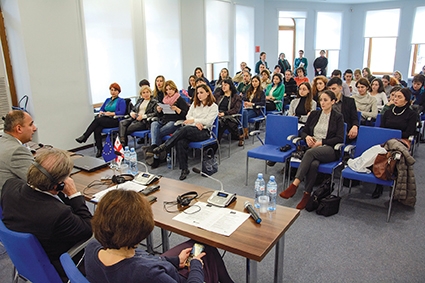EU Declares Culture Important both Aesthetically and Economically
On November 30, at the NATO and EU Information Center in Tbilisi, Mr. Yanos Herman, Ambassador of EU, and Mr. Levan Kharatishvili, Deputy Minister of Culture and Monument Protection of Georgia, met with the media to discuss the contribution of the EU on the subject of culture in Georgia.
The purpose of the EU-Eastern Partnership Culture and Creativity Program is to support the cultural and creative sectors’ contribution to sustainable humanitarian, social and economic development in Armenia, Azerbaijan, Belarus, Georgia, Moldova and Ukraine.
“The EU is providing significant support to Georgia within different projects. The EU is important for us because of its organizations and institutions. We constantly feel its support at every single stage. Culture is not an exception. Several important reforms have taken place in the area of culture in Georgia, thanks to the help and technical assistance of the EU. It is of the utmost importance to mention the cultural strategy – the first ever long-term cultural document in the history of Georgia. This is the largest scale document of its kind” Levan Kharatishvili, Deputy Minister of Culture and Monument Protection of Georgia said at the start of the meeting. “We have already implemented 10 successful projects.” he mentioned.
Thanks to Creative Europe, the European Commission program, the process of creating new industries has begun in Georgia. As Kharatishvili clarified, this is the ground for the future of culture, a kind of ‘cultural industrialization’, making it an important mechanism for the social and economic development of the country.
Janos Herman, Ambassador of the European Union, talked generally about the participation of EU in the field of culture in Georgia: “The EU has been evolving in the last decade the areas which are crucial for our common future. Definitely, culture is one of the main areas. The first step was to develop mechanisms, to provide financial and professional support to develop culture, which is not easy. We have realized that culture can also be an area which generates resources in a way that no other area can, because it generates activities which are linked to the future. Especially in times of transformation, adjustments to the demands of the future; culture is proving itself to be a crucial area”.
Cultural and creative industries amount to 4.5% of the whole GDP of the world. They develop faster than other industries and the service sector. Purportedly, culture is the area which shows the best pace in terms of employment and economic growth in EU countries. Cultural and creative industries give jobs to 8.3 million citizens of the EU. The research on UNESCO development indicators conducted in Georgia, reveal that 5.5% of the local population is employed in the field of culture, which forms about 2.8% of the whole GDP of Georgia.
Georgia was the first country from the list of the Eastern Partnership countries that became a member of the Creative Europe, European Commission program. According to Ketevan Shengelia, Head of Creative Europe Desk Georgia, all publishers are welcome to apply for literary translations. She named Cinedoc, International Documentary Film Festival based in Georgia, and Kote Marjanishvili State Drama Theater among the successful beneficiaries of Creative Europe program.
Maka Lomadze











